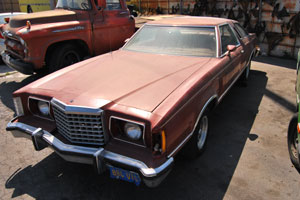
As this radio story airs, Congress is debating two Cash for Clunkers proposals, one from the Senate and one from the House of Representatives. (A third proposal, also from the Senate, is almost identical to the House version.) Both would pay consumers to scrap their "clunkers" in exchange for brand-new, more fuel-efficient models. Both define "clunker" as a car that gets less than 18 miles per gallon. But after that, they diverge.
The House version comes from Democrats on the House Committee on Energy and Commerce. If it passes, a consumer would get a $3,500 voucher for trading in a truck with 15 miles per gallon in exchange for buying a new truck that gets 16 miles per gallon - a one MPG difference. (If the new truck got 17 miles a gallon, the consumer would earn $4,500). That's why environmentalists complain that the legislation is more about stimulating car sales than it is about getting gas guzzlers off the road.
The Senate version proposed by U.S. Senators Dianne Feinstein (D-Calif.), Susan Collins (R-Maine), and Charles Schumer (D-N.Y.), puts the bar a bit higher. In order to qualify for the $3,500 voucher, that same replacement truck would have to get 20 MPG - five miles per gallon more than the old truck. (An improvement of seven miles per gallon would earn the consumer a $4,500 voucher.)
Interestingly, this is a compromise even for Senator Feinstein herself. Check out her original, more stringent, Cash for Clunkers bill here. Proposed in January, it required stricter efficiency from the replacement vehicle, and would have allowed consumers to use their vouchers for used cars, or for public transit. Those conditions were junked, presumably, because they don't stimulate new car sales.
This article from the Christian Science Monitor, takes the number crunching even farther. Among the details worth considering is the "carbon cost" of making all these new vehicles that consumers will be enouraged to buy, should C4C pass: between 3.5 to 12.4 tons of CO2 per vehicle, according to a Duke economist.
